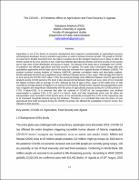| dc.description.abstract | Agriculture is one of the drivers of economic development since Uganda is predominately an agricultural economy and being less developed, its key to transform agriculture in order to achieve economic growth. The growth in COVID-19 cases led to limited movement from one place to another due to the stringent measures put in place to deter the further spread of the virus and this in turn could have affected agricultural activities and food security in the country due to high costs of food distribution and access to inputs. The purpose of the study was to investigate how COVID-19 pandemic has affected agriculture and food security in Uganda. The study used a descriptive design with only quantitative approaches and the data used in this study was extracted from Uganda Bureau of Statistics (UBOS). The analysis involved running Analysis of Variance (ANOVA), pairwise correlation matrix and descriptive analysis. Results indicated that there was asignificant mean difference between prices of rice, sugar, milk and eggs from March to June during the COVID-19 (P-value< 0.05), the actual percentage mean difference between prices of agricultural products during COVID period at 5% level, it also discovered that between March and June, price of rice recorded the highest increase with an average of 4.8%, followed by that of eggs (3.5%), Sugar (3.4%) while price of milk recorded an average decline of negative 6.1% during COVID period. Results further exposed that transportation costs had a negative and insignificant relationship with the prices of agricultural products during the COVID period (r=-0.734, P-value>0.05). It is observed that after the outbreak of COVID-19, the transportation cost declined exponentially to negative 0.6%, 0.7%, and 0.4 in March, April, and May respectively which was far below the transportation costs recorded in 2019 and the price of rice persistently increased from 0.3% to 8% respectively due to its increased household demand during the lockdown. Therefore, it is concluded that since the prices of core agricultural food stuffs increased during the COVID-19 period, this affected the availability of food in homes, thus reduced on food security | en_US |

